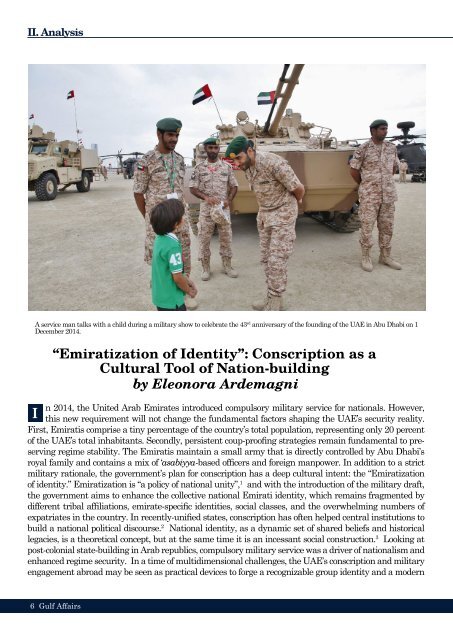You also want an ePaper? Increase the reach of your titles
YUMPU automatically turns print PDFs into web optimized ePapers that Google loves.
II. Analysis<br />
A service man talks with a child during a military show to celebrate the 43 rd anniversary of the founding of the UAE in Abu Dhabi on 1<br />
December 2014.<br />
“Emiratization of <strong>Identity</strong>”: Conscription as a<br />
Cultural Tool of Nation-building<br />
by Eleonora Ardemagni<br />
n 2014, the United Arab Emirates introduced compulsory military service for nationals. However,<br />
this new requirement will not change the fundamental factors shaping the UAE’s security reality.<br />
First, Emiratis comprise a tiny percentage of the country’s total population, representing only 20 percent<br />
of the UAE’s total inhabitants. Secondly, persistent coup-proofing strategies remain fundamental to preserving<br />
regime stability. The Emiratis maintain a small army that is directly controlled by Abu Dhabi’s<br />
royal family and contains a mix of ‘asabiyya-based officers and foreign manpower. In addition to a strict<br />
military rationale, the government’s plan for conscription has a deep cultural intent: the “Emiratization<br />
of identity.” Emiratization is “a policy of national unity”, 1 and with the introduction of the military draft,<br />
the government aims to enhance the collective national Emirati identity, which remains fragmented by<br />
different tribal affiliations, emirate-specific identities, social classes, and the overwhelming numbers of<br />
expatriates in the country. In recently-unified states, conscription has often helped central institutions to<br />
build a national political discourse. 2 National identity, as a dynamic set of shared beliefs and historical<br />
legacies, is a theoretical concept, but at the same time it is an incessant social construction. 3 Looking at<br />
post-colonial state-building in Arab republics, compulsory military service was a driver of nationalism and<br />
enhanced regime security. In a time of multidimensional challenges, the UAE’s conscription and military<br />
engagement abroad may be seen as practical devices to forge a recognizable group identity and a modern<br />
6 Gulf Affairs


